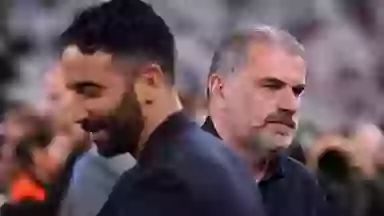UEFA rule change leaves Spurs fearing the worst as Man Utd spared humiliation after final defeat

Tottenham Hotspur’s long-awaited return to the Champions League comes with a significant catch — and it’s all due to a crucial change in UEFA’s tournament structure. After clinching a dramatic 1-0 win over Manchester United in the Europa League final in Bilbao, Spurs not only secured their first piece of silverware in 17 years, but also earned a coveted spot in Europe’s premier club competition for the 2025/26 season.
Manager Ange Postecoglou, who confidently predicted he would bring silverware to North London in his second season, delivered on that promise in style. The victory not only marked a symbolic end to the club’s trophy drought, but it also ushered in a new era filled with hope and financial reward — with Champions League qualification expected to bring in upwards of £100 million in revenue.
Since the 2015/16 season, UEFA has granted Champions League entry to the winners of the Europa League, making the secondary competition an even more valuable route to Europe’s elite tournament. However, Tottenham’s celebration may be somewhat tempered by recent amendments to UEFA’s rules, which have fundamentally reshaped the competition’s landscape — and not necessarily in Spurs’ favour.
Starting with the 2024/25 campaign, UEFA implemented a sweeping overhaul of its club competitions. Gone are the traditional group stages, replaced by a new “Swiss-style” league format that includes 36 teams all in one table. Each club plays eight different opponents, and the top eight finishers automatically progress to the round of 16. The next 16 teams (9th to 24th place) enter a knockout play-off round to join them.
But arguably the most impactful change for Tottenham — and one that could make their return to the Champions League far more difficult — involves the competition’s seeding process. Under the previous system, Europa League winners were rewarded with a spot in Pot One of the Champions League draw, typically granting them a more favourable run of fixtures. That is no longer the case.
UEFA’s revised rule now determines seeding based solely on each club’s UEFA coefficient — a ranking based on recent performances in European competitions. This adjustment proved punishing in the 2024/25 season, when Atalanta, despite winning the Europa League, found themselves in Pot Two. The Italian side ended up in a brutally difficult draw alongside Arsenal, Barcelona, and Real Madrid. Their campaign ended in disappointment, finishing ninth and being eliminated by Club Brugge in the play-off round.
For Tottenham, who currently sit 27th in the UEFA coefficient rankings with 70.250 points, the implications are clear: they are unlikely to be placed in Pot One. Instead, they’ll most likely find themselves in Pot Two or even Pot Three, potentially facing a much tougher selection of opponents in the opening phase of the competition.
Adding to the complexity, Spurs will be one of six English teams participating in the Champions League next season. Thanks to the Premier League’s strong collective performances in Europe last season, UEFA awarded an additional Champions League spot to England, meaning the fifth-placed side also qualified.
The draw for the new-look league phase will take place on 28 August 2025, at which point Tottenham will learn their fate — and possibly brace for a daunting fixture list if their coefficient doesn’t earn them a favourable pot.
Meanwhile, the contrast with their Europa League final opponents couldn’t be starker. Manchester United, after their defeat in Bilbao and a disappointing domestic campaign, have missed out on European football entirely for the upcoming season. As they look to rebuild under new manager Ruben Amorim, Tottenham will be preparing for the challenges — and the opportunities — of the Champions League, albeit under a system that no longer does them any favours.
With the new format and seeding rules in play, Spurs’ return to Europe’s top stage won’t just be a celebration — it will be a test of their resilience, strategy, and depth against some of the continent’s toughest opposition.